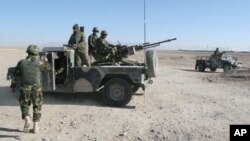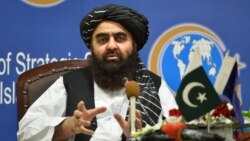Afghanistan does not need a large military anymore and would not keep all the people who worked in the Afghan National Defense and Security Forces (ANDSF) under the previous administration, said the Taliban’s foreign minister, Amir Khan Muttaqi, Friday in Islamabad.
“The army that was created by foreign intervention, we are no longer in need of having such large numbers,” said Muttaqi at a public talk in one of Pakistan’s government-sponsored policy organizations, the Institute of Strategic Studies.
He was responding to a question about the Taliban’s strategy for integrating Taliban fighters and ANDSF personnel into one military, something the Taliban had indicated in the past they might consider if they took over the country.
He said his country needed a small army “made up of people with fidelity and commitment and patriotism ingrained in them.”
The Taliban foreign minister was in Pakistan with a 20-member delegation for negotiations on opening trade routes among other things. On Thursday, he also met the special representatives on Afghanistan from the United States, China, and Russia, who were in Pakistan for a meeting under the Troika Plus format—the three countries plus Pakistan—on Afghanistan.
Muttaqi bristled when asked about issues of human rights and inclusivity in his administration, accusing the international community of using the issues for political purposes.
“Yesterday, the opposition [the Taliban] deserved to die. Yet, that was not a violation [of human rights] and today it is a violation,” he said, warning that the international community has not learned the lesson in 20 years that pressure tactics do not work with the Taliban.
He also claimed the current Taliban administration is inclusive because it has members of various ethnicities in it, but asserts the international community is trying to force them to include their political opponents, which is not the norm anywhere else.
“We have never asked [U.S.] President [Joe] Biden to include [former] president [Donald] Trump in his cabinet,” he said.
Journalist Tahir Khan, who has covered the Taliban for many years, said that so far, the Taliban have not appointed anyone who was not already aligned with them.
“Ninety percent of the appointments are active members of Taliban, either commanders or fighters. The other 10% are their supporters on social media or otherwise.”
In multiple regional conferences on Afghanistan since the Taliban took power, including the Troika Plus in Islamabad Thursday, the demand for inclusivity has taken center stage.
The joint statement issued after Thursday’s meeting “called on the Taliban to work with fellow Afghans to take steps to form an inclusive and representative government that respects the rights of all Afghans and provides for the equal rights of women and girls to participate in all aspects of Afghan society.”
Similar statements were made earlier in conferences in New Delhi, Tehran, and Moscow.
Khan said it was obvious the world “is demanding that the Taliban include other political groups and forces in the government.”
On rights of women to work and study, Muttaqi said the situation is gradually improving.
“Currently, 100% female workers in the health sector have returned to work,” he said. “In [the] education sector, it is now up to 75%.”
He also claimed the Taliban have not fired a single woman from her job since they came to power. Human Rights Watch’s Heather Barr disagreed.
“Maybe they didn’t say to any women you are fired from your job, but they’ve certainly told many, many, many women that they shouldn’t come to work, and they shouldn’t come to work indefinitely,” she said.
Women’s rights activists underscore that since the Taliban takeover of the country, girls in secondary schools in most of the country have been denied access to education, even though boys’ schools are open. Taliban officials say they are working on a plan to open schools for everyone but have not given a time frame.
“We have 200,000 teachers that work in these educational institutions, and we need help and assistance in providing their salaries. No one has yet practically stepped forward to pay their salaries,” Muttaqi said when VOA specifically questioned him on this issue.
Rights advocates say that is an excuse the Taliban are using to discriminate against women.
“If the problem is that they can’t pay teachers, then that’s a problem for boys as well as girls. … and if they’ve made a decision that with limited resources they should prioritize boys’ education over girls’ education, well, that’s very discriminatory, isn’t it?” Barr asked.
The Taliban have repeatedly said they are making preparations to open secondary schools, which, according to Barr, made it sound like the schools needed to comply with their views on Shariah.
“The truth is that there were no mixed government secondary schools in Afghanistan prior to August 15 … so, this is a completely fake reason,” she said.
UNICEF announced earlier this month it was setting up a system to be able to pay Afghan teachers directly, bypassing the Taliban, according to a Reuters report. Funding to or through the Taliban-led administration is frozen by the international community.
In a telephone briefing from Brussels earlier this week, the U.S. special representative on Afghanistan, Thomas West, said several international organizations were doing “creative and urgent thinking” to deliver salaries to teachers, civil servants and other in Afghanistan.
“The United States has not taken a position on this matter,” he said.
Muttaqi said the current Taliban administration was trying to take a balanced approach in international relations, unlike previous governments that either completely caved under international pressure or divorced themselves from the international community altogether. The latter was a reference to the earlier Taliban regime that ruled Afghanistan from 1996-2001.
He said, while formal recognition of the Taliban regime is yet to come, they enjoyed de facto recognition.
“As for international recognition, what we are experiencing is that we are being recognized and treated as an official government of Afghanistan in our travels and in other cases,” he said. “Embassies are open inside our country, and we have embassies and representation in foreign countries.”






